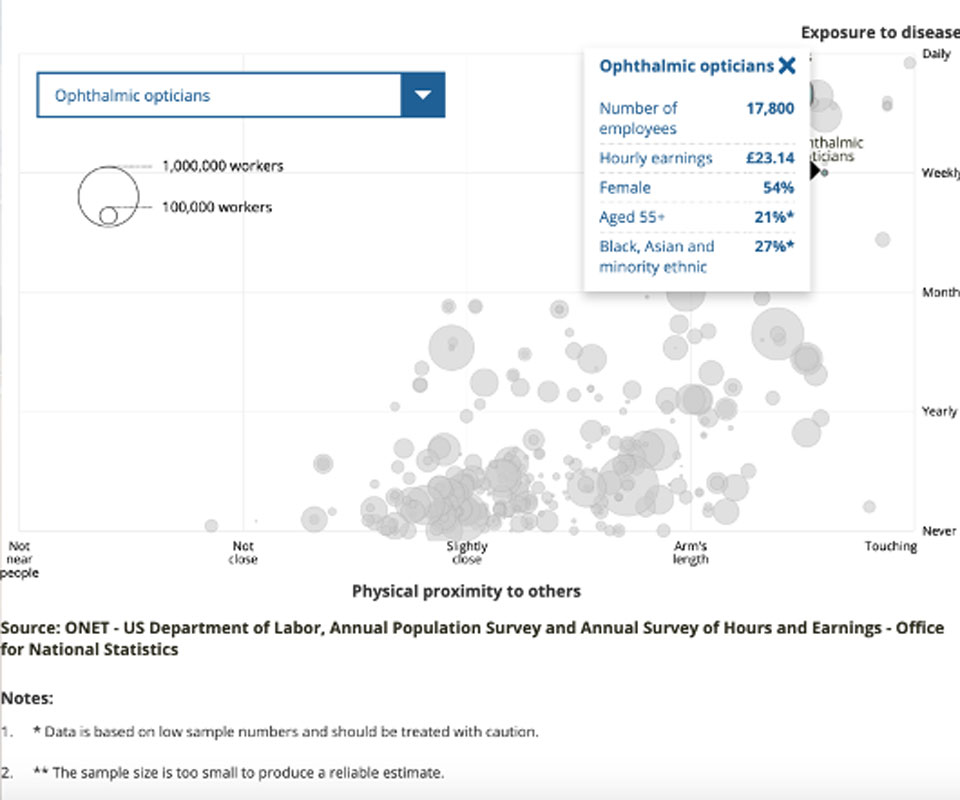- OT
- Industry
- High Street
- Optometry ninth out of 359 professions ranked by proximity to customers
Optometry ninth out of 359 professions ranked by proximity to customers
ONS data shows 'ophthalmic opticians' are among those occupations at a higher potential exposure to the coronavirus, based on typical exposure to disease and physical proximity to others

15 May 2020
The Office for National Statistics (ONS) has estimated which UK occupations have a higher potential exposure to coronavirus (COVID-19), with 'ophthalmic opticians'* included amongst those facing the highest risk.
The estimates consider the occupations that involve working in close proximity to others and those that are regularly exposed to diseases, which the ONS suggests provides a useful indication of which roles may be more likely to come into contact with people with COVID-19.
It is important to note, however, that the UK estimates are based on US analysis of these factors and use 2019 data – so don’t take into account measures introduced due to COVID-19.
The analysis highlighted that healthcare workers have a particularly high potential risk, due to regular exposure to disease and close contact with others, though pointed out that “during the pandemic they are more likely to be using personal protective equipment.”
According to the ONS, ‘ophthalmic opticians’ were at the higher end of the scale, ranking at 17 out the 359 professions for exposure to disease, and nine for proximity to others. This suggests eye care professionals may be subject to higher potential risk, with “weekly” exposure to diseases and physical proximity typically between arm’s length and touching distance.

However, analysts have also reported that despite the higher potential for exposure, healthcare workers such as doctors and nurses “did not have higher rates of COVID-19 deaths compared with the rate among those of the same age and sex in the population as a whole.”
Analysts suggested this could be because healthcare professionals are more likely to be using PPE or may have greater awareness of hygiene measures. The ONS also suggested some healthcare workers may have reduced exposure to COVID-19 during lockdown due to a suspension of routine appointments.
Commenting on the ONS estimates, AOP clinical director, Dr Peter Hampson, said: “This data is representative of the concerns of our members due to the COVID-19 exposure risk that is evident across all of the healthcare professions and highlights the need for personal protective equipment (PPE) for optical practitioners.”
The results pose important questions for the implications COVID-19 could continue to have on practice post-lockdown, and come as the World Health Organization warned in a briefing this week that coronavirus “might never go away” and that there may still be a long way to go to end the pandemic.
Continuing, Dr Hampson said: “As restrictions begin to ease and we gradually move out of lockdown with practitioners returning to providing routine care, they will increasingly be working in close proximity to patients. The priority now is setting out how we can mitigate against the risks to enable practitioners to return to work safely and with confidence.”
An OT poll last week of more than 930 participants revealed that the majority of respondents (79%) felt it was too soon to change the Government’s policy requiring all non-essential workers to stay home.
Though the Government has confirmed some sectors of the economy are allowed to reopen, routine sight testing remains suspended across the UK and the advice around the delivery of essential, urgent and emergency eye care remains in place.
In a statement ahead of the Government announcement last Sunday (10 May), AOP chairman, Mike George, said that for optometrists, this “won’t be a return to ‘business as usual’”, adding: “For our members who work in or run optometry practices, and for those working in areas such as domiciliary care and hospital optometry, the ongoing public health risk posed by COVID-19 means everyone will have to work in different ways.”
* The ONS in their research uses the term “ophthalmic opticians” in place of “optometrists”. We have used this term within this piece in order to avoid misrepresenting the data.
As the coronavirus (COVID-19) pandemic transforms the way optometrists practise, OT is sharing the experiences of optometrists across the UK. If you, or a colleague, is interested in sharing your story, please get in touch by email.
OT endeavours to keep the most up-to-date news on our website and this information was correct when published. However, the situation regarding COVID-19 is rapidly evolving. Please check OT’s rolling optics-specific coverage for the latest news and guidance on COVID-19.


Comments (1)
You must be logged in to join the discussion. Log in
Anonymous22 May 2020
Hi if we are in close proximity to Pxs & we catch flus off them & then we pass these on to others, then why doesn’t the DOH make it mandatory for optoms to have the flu jab - NHS staff all get the NHS jabs free via the NHS- why can’t AOP lobby for us to get them free as well?
Report Like 325